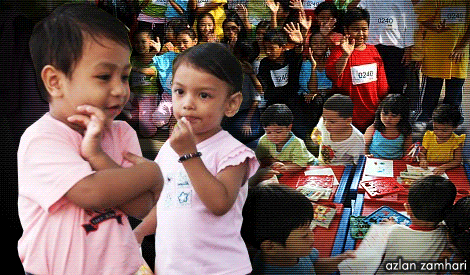
The Deputy Minister for Women, Family and Community Development Hannah Yeoh made an important policy intention regarding the key issue of safeguarding children, that is, the screening of those who work with children.
For far too long, those unsuitable and those deemed ‘undesirable’ have been allowed to destroy young lives through a combination of general apathy on the part of adults and a lack of diligence by some children- affiliated agencies such as schools, care centres and orphanages. (Remember the high profile cases reported variously in 2013?)
Citing the high recorded cases of child abuse in the country of over 20,000 in the last five years, the minister rightly advised parents to exercise greater monitoring, education on sex and care, with the promise of greater support and counselling for victims.
Therefore, will focussed attention and encouragement by parents and caregivers with the strengthening counselling resources at schools as well as widespread information about the Talian Kasih helpline be enough? This is a good start; i.e. prevention efforts, access to the helpline and a post-trauma rescue service.
I hope the “work in progress” as the minister stated will spell out the message that child protection is the responsibility of all, in society. It is not only the government's alone but everyone's. Sure, the government must show the lead and must allocate resources to underpin its importance but all sections in society must also act in support.
To start with, the government needs to get all the statutory key agencies to act together and to develop a joint policy whose sole objective is to safeguard and protect children.
Unlike the sexual offenders' registry which has a list of those convicted of a criminal offence, this process of eliminating those unsuitable is a ‘vetting and barring’ scheme. The UK government does operate a scheme for this purpose and their own development and experience can be shared and adapted to the Malaysian context.
In my experience, the existence of a similar type of registry rests on the principles of civil law and the evidence sought is not along the desirability as with criminal law, which seeks a ‘beyond reasonable doubt’ conviction. Rather it is loosely based on employment law, where evidence gathered is based around “balance of probabilities”.
In the UK, there was a registry collected by the education ministry there of teachers who had been dismissed for gross misconduct (not criminally convicted) or medical/para-medical staff dismissed for professional misconduct. Details of such individuals would be stored in a register. All employing authorities (education, social care and Health) would check with those lists prior during the recruitment process.
With such a safety-cum-screening resource in place, it would be ‘reassuring’ to the public that service providers to children comply with this requirement. The Malaysian ministry must proceed to set up such a register as a way of screening.
To further extend and continue the quality assurance of the establishments concerned, the registration of a service provider, e.g. a nursery (taska, tadika), children’s home (orphanage), all public and private schools, tahfiz schools, must be mandatory.
It must be that unless establishments are subjected to scheduled checks and inspections, they will not be allowed a license to operate. The registration requirements, therefore, must be strengthened and rigorously enforced.
And perhaps, as a sweetener to encourage good practice, tax incentives could be offered in return for strict compliance to those accepted standards.
I am sure many will look forward to an announcement on further details or an implementation timetable. - Mkini
Source | https://malaysiansmustknowthetruth.blogspot.com/2018/11/have-registry-for-offending-child.html
Most View Article This Month !


